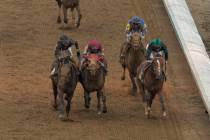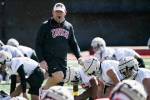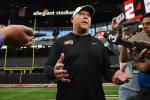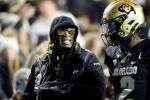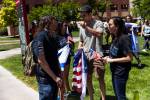Public records reveal UNLV’s APR strategy
UNLV officials knew last summer the football program was falling short of NCAA academic standards, and they tried for months to avoid a bowl ban, according to a review of public records obtained by the Review-Journal.
It was clear in July the Rebels were going to fall short of the minimum Academic Progress Rate set by the NCAA. So UNLV submitted dozens of supporting pages to the NCAA that included a list of self-imposed penalties.
But NCAA officials decided those efforts didn’t go far enough and denied UNLV’s final appeal on April 10.
“Our institution presented a compelling and detailed appeal and found that the folks on the NCAA committee who were from member institutions really seemed to get it,” UNLV athletic director Tina Kunzer-Murphy said in a statement to the Review-Journal. “We had a lengthy and spirited discussion as part of making our case, and those committee members on our call really seemed empathetic to our circumstances. They understood how the severe budget cuts our university was forced to make led to turnover and inconsistency in our academic advising unit for football, and how that inconsistency in turn led to under-performance in the APR.
“We were not privy to what happened after the call ended and those members then met with NCAA staff. We were disappointed to later learn that we were denied, but we feel we took our best shot and would not change anything in our appeal. The intent in the NCAA’s APR program was correct, but I think the mechanism is flawed. I don’t think it’s working as the NCAA intended, and it is something that we hope they’ll take a look at moving forward.”
The timing of the bowl ban couldn’t have been worse for the Rebels, who made their first bowl appearance in 13 years on Jan. 1. UNLV also lost four hours of practice time each week, which must be spent on academics. Players also will be limited to five football-related days of activities instead of six.
The back-and-forth discussion between UNLV and the NCAA was revealed in records obtained through a Freedom of Information Act request by the Review-Journal.
UNLV offered a series of self-imposed penalties, argued there were mitigating circumstances, hinted that transfers from one unnamed junior college were responsible for part of the problem, and outlined the steps the university already is taking to correct these problems.
The records also show some good news: If it doesn’t slip up, the football team should be bowl eligible again in 2015.
When faced with being shut out of a bowl before the 2014 season even began, according to public records, UNLV instead offered the following self-imposed penalties:
— Loss of two scholarships for next season.
— Reduction in recruiting days that would be determined by the NCAA.
— A cap on the number of scholarship transfers at six per academic year.
— Attendance by coaches, senior sport administrators and academic advisers at a NCAA regional rules seminar, who then would put together a presentation for the entire athletic department.
— Two appearances by coach Bobby Hauck at local high schools to discuss the importance of academics.
— Prohibition of scholarships to players who lose two APR points in an academic year or three in their five-year eligibility clock. Athletes earn up to four APR points in an academic year, one each semester for being eligible and one each term for being retained by the university.
The NCAA dismissed the Rebels’ offer, writing the self-imposed penalties were “not considered as serious or meaningful as the loss of postseason competition.”
The governing body for collegiate sports also turned down UNLV’s attempt to show mitigating circumstances, which included massive university-wide budget cuts and high turnover in the Student-Athlete Academic Services (SAAS) office. SAAS is responsible for providing academic assistance to athletes from when they arrive on campus until graduation.
Mitigation “was not considered extraordinary as defined by the committee in its policies and waiver directive,” the NCAA wrote. “The mitigation was not considered outside the control of the institution, the department of athletics and the student-athletes and did not impact the team’s APR over multiple years. Failure to meet the requirement for extraordinary mitigation in and of itself resulted in the staff denial pursuant to the committee’s policies and procedures.”
If there was good news to come out of the records for UNLV, it was that the football program should meet the APR number of 930 in time for the 2015 season. The Rebels missed that minimum by five points for the upcoming season.
David Wedley, SAAS assistant director/UNLV athletic academic adviser, wrote March 5 to Anne Rohlman, NCAA assistant director of academic and membership affairs, the program was on the proper track in addressing its APR issue and should have immediate relief.
He said UNLV is in position to raise the four-year average, projecting a single-year APR score of 969 in the 2014-15 academic year, which would raise the figure to 930. Specifically, Wedley projected UNLV to earn 81 of 88 eligibility points and 87 of 88 retention points for fall 2013 and an APR semester score of 954; 84 of 88 eligibility points and 85 of 88 retention points for spring 2014 and a 960 semester score; 165 of 176 eligibility points for the 2014-15 academic year and 172 of 176 retention points; and four delayed graduation points.
Because that score would put UNLV right at the minimum required average, it leaves the athletic department with little room for error. The projections must come through, and the school has been working to get those with exhausted athletic eligibility who have not graduated to finish their degrees.
According to an August email, Wedley noted 17 former players as being “highly or moderately likely to return to finish their degree.”
Wedley and then-SAAS assistant director Johnna Strenchock — now director of academic development for football at California — became “extremely concerned about the severity of the program’s APR situation” last summer and began running projections six weeks before the beginning of the fall semester in late August.
They met Aug. 5 with Kunzer-Murphy, Hauck, compliance director Eric Toliver, assistant athletic director for compliance and SAAS Rebecca Pugh and director of football operations Terry Cottle, among others.
UNLV presented its case regarding what it termed “extraordinary mitigating circumstances,” listing:
— Elimination of 15 academic programs and 31 degree programs, as well as more than 700 faculty and staff positions.
— The athletics operating budget was cut by $3.7 million since 2008, while expenditures rose by $4 million over that same time.
— Layoffs in SAAS created a smaller staff.
— Study hall moved to Lied Athletic Complex after 2010-11 academic year, which was large enough but didn’t have the proper layout or amenities.
In a March 5 email, UNLV further explained the heavy turnover at SAAS, documenting the revolving door since 2009, with eight advisers working with the football program at various times since then. David Jackson was hired to oversee SAAS in May 2011, and later that year became the sole adviser for men’s basketball, baseball, men’s golf, cross country and three football position groups.
Those sport-specific duties were in addition to his job responsibilities that included being in charge of personnel, academic compliance and regular meetings with executive and athletic department staff.
More than highlighting the challenges, UNLV also presented the steps it had taken to address the low APR, putting together what was titled a “UNLV Football Academic Recovery and Improvement Plan” as well as an “APR improvement plan.”
The school is spending $255,000 to $275,000, including $80,000 for the new position of assistant athletic director for compliance and SAAS, $55,000 to $73,000 for a new learning specialist and $40,000 for a new academic support adviser. UNLV also is putting money into 18 new laptops, GradesFirst Software, renovation of the tennis complex to host daytime study hall and remodeling of the study area.
UNLV also decided not to recruit from an unidentified junior college that records state had helped cause the APR problems.
“We have reason to believe the students from that school are not academically prepared to succeed at a four-year institution, regardless of what is listed on their transcript,” Wedley wrote to Rohlman.
Though the university didn’t identify which junior college in the documents or in a follow-up question, the Rebels signed four players from the College of the Sequoias in Visalia, Calif., in 2011, but none since then.
Public records also made it clear most of the problems occurred in a two-year span that included that period.
“Our institution intends to prove that what occurred during the 2011-2012 and 2012-2013 academic years were anomalies,” Wedley wrote Rohlman, “and that they will not happen again.”
Contact reporter Mark Anderson at manderson@reviewjournal.com or 702-387-2914. Follow him on Twitter: @markanderson65.






















